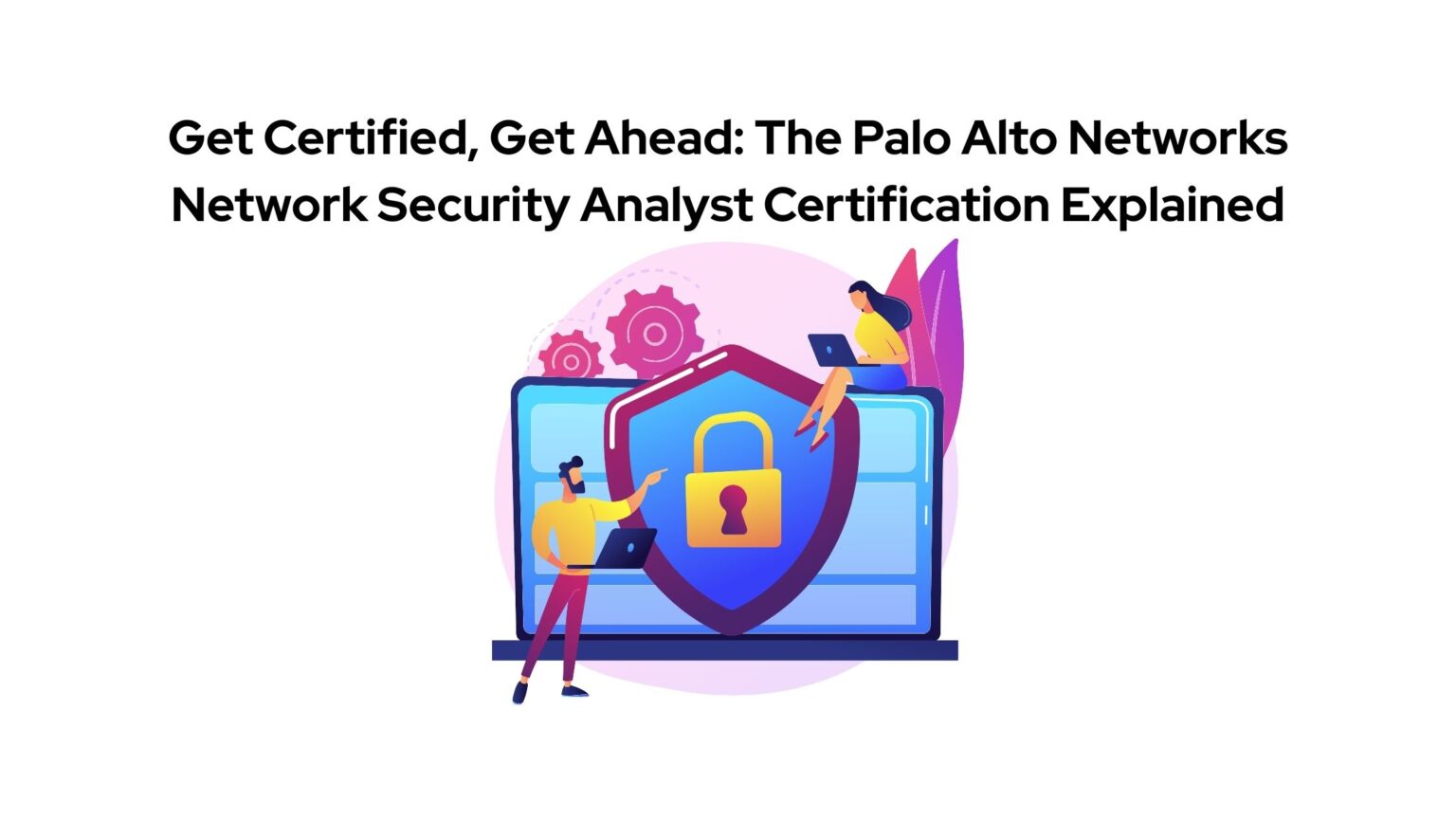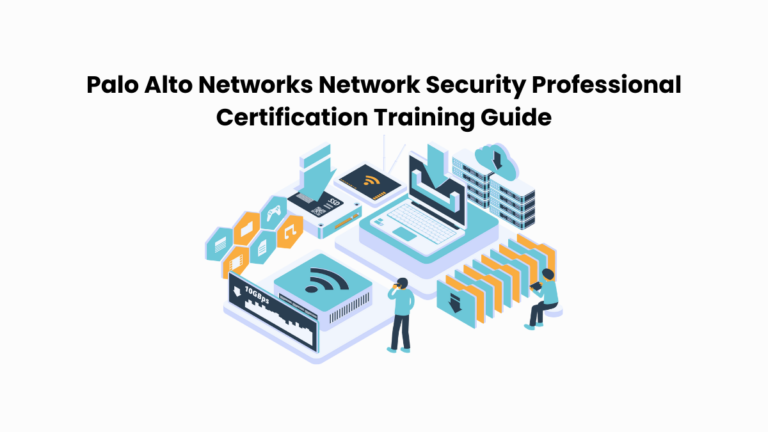If you are a network security professional or firewall administrator, you know that today’s threat landscape is relentless. One moment, you are configuring a next-generation firewall; the next, you are navigating cloud integrations, securing remote endpoints, and responding to alerts that never seem to stop. You are not just managing infrastructure, you are defending it.
According to Palo Alto Networks’ Unit 42 report, 86% of cyber incidents in 2024 resulted in business-impacting disruptions, including operational downtime and reputational loss. Alarmingly, many of these incidents were traced back to misconfigured firewalls and delayed responses.
The Palo Alto Networks Network Security Analyst certification was built to help you get ahead of these challenges. It validates your ability to configure firewalls, apply dynamic security policies, and manage centralized operations through Strata Cloud Manager. This is not just a theoretical badge; it is a practical certification for those who need to secure real networks in real time.
Why Take the Palo Alto Networks Network Security Analyst Certification?
The Palo Alto Networks Network Security Analyst certification is not just another line on your résumé. It is a strategic investment in your career, designed to solve real-world problems faced by network security professionals today. Here is why it matters:
#1. Validate real-world, product-based skills
This certification focuses on hands-on, job-relevant skills using Palo Alto Networks’ Strata Cloud Manager. You will learn to create security profiles, configure dynamic objects, and apply policies that directly affect security outcomes, skills hiring managers are actively looking for.
#2. Stand out in a competitive job market
With cybersecurity roles evolving rapidly, employers are prioritizing candidates who can demonstrate operational readiness. This certification signals that you can manage and optimize firewall operations in real-time environments, not just in theory.
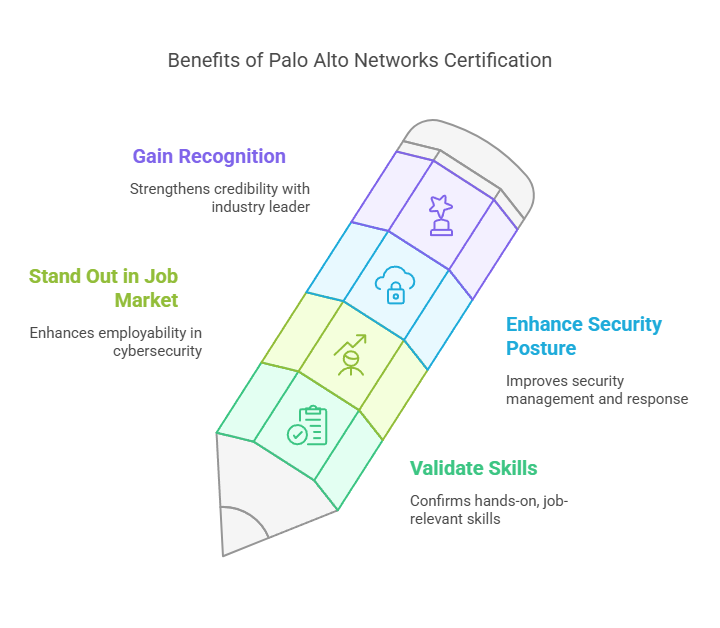
#3. Enhance security posture through centralized management
Strata Cloud Manager is at the core of Palo Alto Networks’ vision for centralized, cloud-delivered security management. By mastering this platform, you can proactively improve security posture, optimize policy management, and respond faster to incidents across distributed environments.
#4. Gain recognition from a market leader
Palo Alto Networks is trusted by enterprises and governments worldwide. Being certified by an industry leader strengthens your professional credibility and opens doors to advanced roles in SOCs, managed security services, and enterprise IT teams.
Whether you are looking to elevate your current role or transition into a more specialized security position, this certification provides a powerful foundation.
Prefer a visual overview before committing? This short video introduces the Palo Alto Networks Network Security Analyst certification, outlining the target audience, key topics, and career impact. It’s a great way to get a feel for the course and decide if it aligns with your professional goals. Give it a watch below!
Palo Alto Networks Network Security Analyst Certification Overview
Here is the breakdown of the certification details:
| Detail | Description |
| Certification Duration | Self-paced study + exam preparation (The certification exam is 90 minutes long) |
| Delivery Format | Online proctored certification exam available through Pearson VUE |
| Certification Level | Intermediate to advanced |
| Target Audience | Security professionals configuring firewalls, managing policies, and using SCM |
| Prerequisites | Experience with Palo Alto Networks firewalls and centralized management tools |
Target Audience
The Palo Alto Networks Network Security Analyst Certification is ideal for professionals who actively manage firewalls and are responsible for improving network security posture. This certification is designed for Professionals like:
- Network security analysts
- Firewall administrators
- Network engineers
- Security engineers
- Professional services consultants
- Technical support engineers
Prerequisites
There are no mandatory prerequisites for the Palo Alto Networks Network Security Analyst Certification, but candidates should possess hands-on experience with Palo Alto Networks technologies.
Recommended knowledge and experience include:
a. Proficiency in:
- Palo Alto Networks firewalls (hardware, CN-Series, VM-Series)
- Using Strata Cloud Manager for device and policy management
b. Understanding of:
- Centralized policy management and dynamic object configuration
- Advanced troubleshooting concepts across security platforms
c. Operational familiarity with:
- Logging services, policy optimizers, and centralized incident response
- Secure SD-WAN implementations and DoS protection
Enrolling in the Palo Alto Networks Network Security Analyst Certification
Getting started with the Palo Alto Network Security Analyst certification is straightforward and designed to support your success. You can register directly through Pearson VUE or partner with an authorized training provider, such as Datacipher Education Services.
Datacipher is recognized for delivering hands-on training and role-specific learning paths that align with the certification framework.
The step-by-step enrollment process is as follows:
#1. Explore the certification pathway.
Begin by visiting the Palo Alto Networks certification portal or head over to Datacipher’s website. As a trusted Authorized Training Provider, Datacipher offers tailored training solutions that map directly to the skills evaluated in the Network Security Analyst certification.
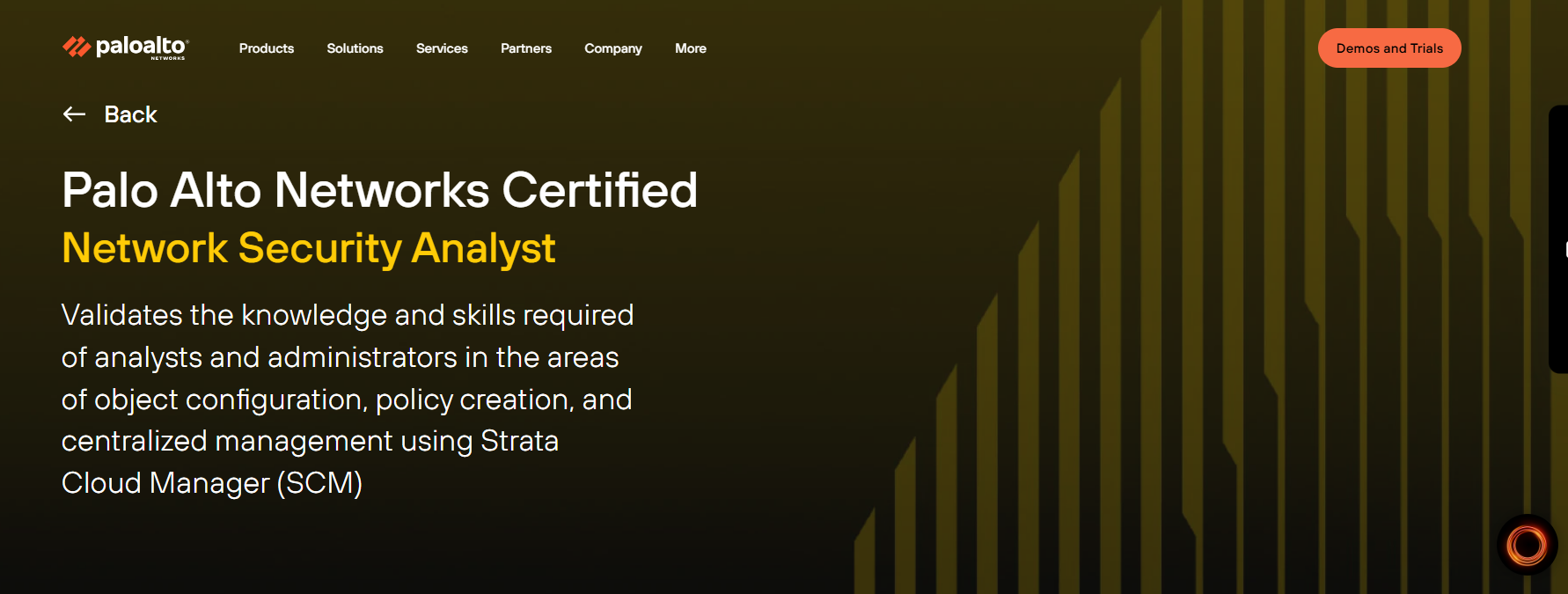
Source: Palo Alto Networks
#2. Select the Network Security Analyst certification track.
Choose the Network Security Analyst certification from the list of available Palo Alto Networks credentials. Review the exam blueprint, domain objectives, and preparation resources to get familiar with what is expected on the test.
#3. Register for your exam through Pearson VUE.
Once ready, go to the Pearson VUE portal to book your exam. If you are training with Datacipher, their support team can guide you through the scheduling and registration steps.
#4. Choose your exam date and submit payment.
Pick a time slot that fits your schedule. The exam is delivered online via remote proctoring, offering the flexibility to test from your home or office. During registration, you will pay the certification fee, which may vary based on your location or any applicable offers.

Source: Datacipher
As an Authorized Training Provider, Datacipher Education Services equips professionals with more than just theory. Their certification training programs include real-world labs, guided exercises, and expert mentorship to help you build practical confidence.
Whether you are validating existing skills or leveling up for a new role, Datacipher ensures you are not only ready to pass the exam but to thrive in production environments.
A Breakdown of the Palo Alto Networks Network Security Analyst Modules
The Palo Alto Networks Network Security Analyst certification exam focuses on four critical knowledge domains. Each module reflects essential skills required to secure, configure, and manage firewall policies and infrastructure using Palo Alto Networks technologies, particularly through Strata Cloud Manager.
The certification training covers the following modules:
- Object Configuration Creation and Application
- Policy Creation and Application
- Management and Operations
- Troubleshooting
By the end of this certification, you will be able to:
#1. Create and manage advanced security objects across environments.
Learn to configure and apply dynamic security profiles, decryption settings, custom objects, and SD-WAN templates. These capabilities help secure applications, devices, and data in real-world deployments.
#2. Design and implement policy-driven security frameworks.
Understand how to build effective security, NAT, and decryption policies using App-ID, User-ID, and Content-ID. You will also master policy-based forwarding and SLA-driven SD-WAN routing.
#3. Operate centralized management using Strata Cloud Manager.
Gain hands-on experience in using SCM features like folders, snippets, automation, and log analysis to streamline firewall administration and security posture improvements.
#4. Troubleshoot system-wide configuration and health issues.
Learn diagnostic techniques to resolve misconfigurations, runtime errors, push failures, and device health anomalies, ensuring system reliability and operational continuity.
You can also refer to the Network Security Analyst Certification Datasheet for a comprehensive understanding of the training modules.
Next Steps
After earning the Palo Alto Networks Network Security Analyst certification, the most relevant advanced certifications to pursue are:
Next-Generation Firewall Engineer – Deepens your expertise in advanced firewall deployment and complex rule sets across enterprise environments.
Security Service Edge Engineer – Ideal for professionals managing cloud-based perimeter security and secure access across SaaS and hybrid environments.
XSIAM Analyst – Designed for analysts working in Security Operations Centers using AI-driven threat detection and response platforms like Cortex XSIAM.
These certifications are part of the specialist-level pathway and build on the foundation established by the Network Security Analyst role.
How to Prepare for the Palo Alto Networks Network Security Analyst Certification Exam?
Preparing for the Palo Alto Networks Network Security Analyst certification requires a hands-on, product-centric study plan focused on real-world use cases. Below is a detailed guide to help you prepare effectively:
| Feature | Details |
| Type | Multiple-choice and multiple-select, online proctored |
| Duration | 90 minutes (plus a 30-minute ESL extension where applicable) |
| Passing Score | Not publicly disclosed (Scaled score: 300–1000; typical passing score: 860) |
| Language | English |
| Delivery | Online via Pearson VUE |
| Cost | $250 USD (Subject to taxes and regional pricing adjustments) |
Recommended Study Materials and Resources
To succeed in the Palo Alto Networks Network Security Analyst exam, use these trusted, official resources from Palo Alto Networks:
Certification Handbook: A must-read that outlines domain weightings, candidate policies, and exam logistics. You can download the Certification Handbook here.
Certification Program FAQ: Answers key questions about the exam process, retake policies, and eligibility. Access the Certification FAQ here.
Palo Alto Networks TechDocs and Knowledge Base: Deep dive into platform functionalities, object configuration, SCM tools, and policy optimization. Explore TechDocs and the Knowledge Base here.
Cyberpedia and Resource Center: Visualize core concepts, review quick-reference guides, and reinforce learning with video content. Explore Cyberpedia and the Resource Center here. Explore the digital learning paths here.
Tips to Crack the Palo Alto Networks Network Security Analyst Certification Exam
Based on the certification blueprint and practical exam insights, the following tips can help you prepare effectively and approach the exam with confidence:
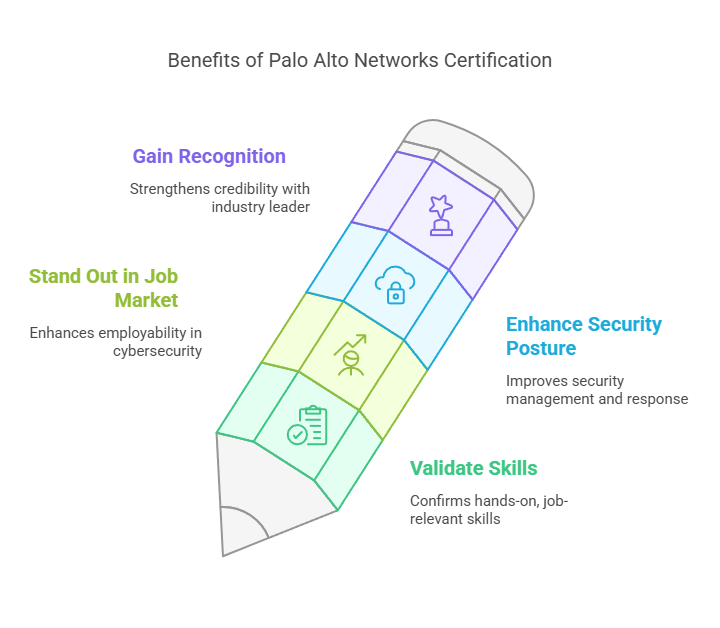
#1. Focus on Object Configuration Mastery (30%)
Gain a strong understanding of creating and applying security profiles, decryption profiles, dynamic lists, and custom objects. Learn to implement profiles for IoT security, data protection, DoS prevention, and SD-WAN configuration using real-world scenarios.
#2. Strengthen Your Policy Creation Skills (30%)
Study how to configure App-ID, User-ID, and Content-ID-based security policies. Get hands-on with NAT policies, decryption and application override rules, policy-based forwarding (PBF), and SLA-based SD-WAN routing strategies.
#3. Learn Centralized Management with SCM (26%)
Master the Strata Cloud Manager (SCM) environment, practice using folders, snippets, variables, and automation features. Explore using tools like Command Center, Policy Optimizer, Activity Insights, and Logging Service to elevate operational visibility and control.
#4. Sharpen Your Troubleshooting Techniques (14%)
Understand how to diagnose and fix configuration errors, commit/push failures, and device health issues. Review system logs, incident reports, and alerts to develop a structured approach to real-time issue remediation.
To maximize your preparation:
#1. Use the official exam blueprint and domain breakdown from the Palo Alto Networks Certification Handbook.
#2. Apply your knowledge in lab environments with object creation, policy testing, and management tasks.
#3. Enroll with an Authorized Training Partner like Datacipher Education Services for hands-on labs, expert insights, and real-world simulations tailored to this certification.
Become a Network Security Analyst Expert with Datacipher Education Services

Source: Datacipher
Datacipher Education Services is a trusted Palo Alto Networks Authorized Training Partner, known for delivering industry-relevant, high-impact training for cybersecurity professionals. Whether you are preparing for the Network Security Analyst certification or enhancing your practical skills, Datacipher provides the environment, expertise, and resources to support your success.
Why choose Datacipher?
#1. Expert-led instruction: Learn from certified instructors with deep real-world experience in Palo Alto Networks technologies and security operations.
#2. Real-world lab environments: Engage in interactive labs and use-case-based exercises that mirror real enterprise challenges.
#3. Up-to-date curriculum: Course content is mapped directly to certification blueprints and adapted to evolving industry demands.
#4. Flexible training options: Choose from virtual classrooms or in-person sessions tailored to individual and organizational needs.
This approach has made a measurable difference for learners across the industry. As Rohan Iyer, Senior Network Security Consultant at Capgemini, shares:
“Datacipher’s training was a turning point for our security team. The hands-on labs and expert-led sessions gave us the confidence to implement best practices and manage Palo Alto Networks firewalls more effectively across client environments.”
Ready to Elevate Your Cybersecurity Career? Whether you’re looking to enhance your technical capabilities or transition into a more advanced role, Datacipher is your ideal partner. Start your training today.
Frequently Asked Questions
1. What is Strata Cloud Manager, and why is it central to this certification?
Strata Cloud Manager is Palo Alto Networks’ centralized, cloud-delivered management platform. It enables policy creation, object management, and visibility across distributed firewalls. This certification emphasizes SCM because it reflects how modern enterprises operate at scale.
2. How does this certification differ from the Retiring PCNSE or other Palo Alto Networks role-based certifications?
Unlike the broad PCNSE certification, this certification focuses on real-world analyst skills directly tied to firewall configuration and centralized management. It aligns with current product usage, especially around SCM and security services. The focus is operational and hands-on, rather than theoretical or architecture-heavy.
3. How does this certification help with securing hybrid and multi-cloud environments?
You’ll learn to utilize centralized tools, such as SCM, and cloud-native policies to manage diverse deployments. This includes configuring security for both on-prem and cloud-based firewalls. The skills gained will help you maintain consistent policy enforcement across hybrid architectures.

